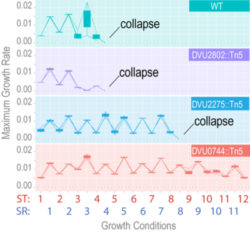
Serdar Turkarslan, a Senior Research Scientist at the Institute for Systems Biology in Seattle, Washington; along with a team of researchers has developed a framework to quantify microbial community resilience in the face of environmental changes.
This framework will be invaluable for observing the behavior of microbial communities under simulations of current and projected environmental conditions. Their work will enable ENIGMA to make predictions about the future of ecosystems and identify mechanisms to protect them. Read more on the Biosciences Area website and the ISB website.
- We demonstrated that conditional gene regulation for adapting to new environments can become detrimental and lead to population collapse when resource fluctuations are too frequent.
- We discovered that regulation-driven dilution of essential cellular components made energetic cost of restoring the growth condition-relevant physiological state progressively more burdensome, and eventually unsustainable.
- The collapse can be rescued by disruption of conditional regulation of essential transcripts and proteins
Just prior to collapse, the transcriptome of the wild type Dv appeared dramatically different from the state appropriate for the growth condition (SR or ST). By contrast, the knockout of the regulator (DVU0744) allowed Dv to reproducibly adopt the appropriate state for each growth condition.
The fraction of single cells of wild-type Dv expressing transcripts essential for SR dropped significantly with repeated transitions, with very few cells expressing essential transcripts just prior to collapse. The structure of the regulatory mutant population by contrast remained unchanged.
Mechanism for microbial population collapse in a fluctuating resource environment
Turkarslan, S., A.V Raman, A.W Thompson, C.E Arens, M.A Gillespie, F von Netzer, K.L Hillesland, S Stolyar, A López García de Lomana, D.J Reiss, D Gorman‐Lewis, G.M Zane, J.A Ranish, J.D Wall, D.A Stahl, and N.S Baliga. (2017) Molecular Systems Biology 13(3) http://msb.embopress.org/content/13/3/919
